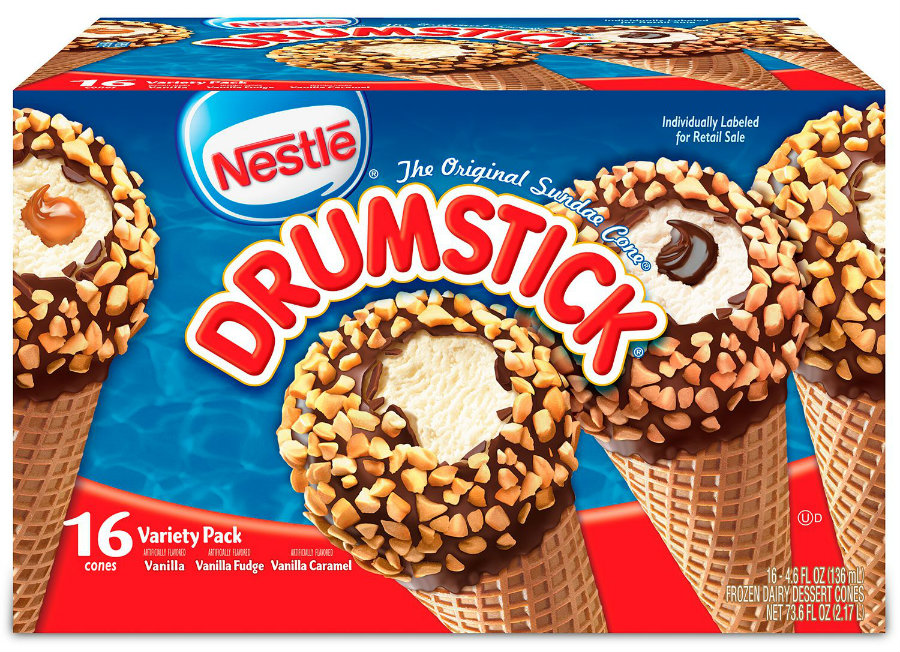Nestlé recalls its Drumstick ice cream cones on a national level after it was discovered the California factory where the sweets are made is contaminated with Listeria.
So far, none of the Drumstick products have tested positively for the bacteria, and there have not been reports of people getting sick, as stated by the U.S. Food and Drug Administration.

The Nestlé factory located in Bakersfield, California, tested positive on its equipment of a particular production line used to make Drumstick products, as claimed by the company itself. To prevent damaging the health of its customers, Nestlé decided to do a voluntary recall, that includes all 24 count Vanilla Pack and the Drumstick Club 16 count Variety Pack units made between August 31 and September 17.
According to the company, the problem was discovered through routinely internal testing, but the products had already been shipped due to an error in “logging [the] receipt of the test result.”
All customers that have bought ice cream made in the particular period are being urged to return them to the stores or directly contact Nestlé Consumer Services.
In 2015, a batch of Blue Bell ice cream got contaminated with Listeria, which resulted in ten people being hospitalized and three deaths. However, Nestlé has distanced itself from the case.
“Our situation is much different from Blue Bell’s in a number of significant ways, including: (1) we have received no reports of human illnesses; (2) we have no listeria findings in the ice cream itself (just the equipment); (3) we have only one product line affected; (4) we have only one facility affected; and (5) we self-identified this event and took precautionary steps to recall product,” claimed the company through an official statement.
The Listeriosis infection
Listeria is a bacteria genus that is comprised of fifteen known species with two subspecies each. The L. monocytogenes is the major human pathogen of the genus and is usually the bacteria that causes listeriosis, although L. grayi and L. ivanovii have appeared in particular cases.
Listeria usually causes bacteremia (presence of bacteria in the blood) in immunocompromised people, gastroenteritis in healthy individuals and infections of the central nervous system in vulnerable groups (children and the elder) which include cerebritis, meningitis, brain abscess and meningoencephalitis.

The symptoms vary depending on the person. For pregnant women, the symptoms are similar to the mild flu, but the disease can lead to stillbirth and miscarriages. For the senior and children, fever is common, alongside confusion, convulsions and muscle aches. Healthy adults commonly experience fever and diarrhea.
Some of the most famous Listeria cases in the U.S.
On October 12, 2002, Pilgrim’s Pride Foods recalled almost thirty million pounds of deli turkey and chicken meat after an outbreak of Listeriosis. Fifty-four people get sick, eight died, and three fetal deaths occurred in several states.
On 2011, another outbreak occurred, this time through contaminated cantaloupes grown at Jensen Farms in Granada, Colorado. Thirty-three people died, and 147 got sick. Health officials cataloged it as the “deadliest food outbreak in the United States in nearly 100 years,” and the brothers who owned the farm, and Ryan Jensen were sentenced to five years’ probation.
A year later occurred a new multistate outbreak was reported, this time, associated with Frescolina Marte Brand Ricotta Salata Cheese. Three deaths and twenty-two illnesses are reported in thirteen states. By 2013, Crave Brothers Farmstead Cheese Company in Wisconsin recalled three type of cheeses for Listeria contamination that ends with one casualty and six illneses.
Even caramel apples can contain the bacteria, as was shown during December 2014, when a new outbreak happened. By January last year, Bidart Bros. voluntarily recalled their Gala and Granny Smith apples after they also tested positive for Listeria, which leads to seven deaths and thirty-two people infected, including a case in Canada, according to the Public Health Agency of Canada.
In April 2016 occurred the most recent outbreak, when CRF Frozen Foods recalled all frozen fruit and vegetable products that were produced at its Washington, facility since May 2014, which accounts for almost four hundred products sold under forty-two brands. The epidemic was declared over in July, after three casualties and nine hospitalizations.
Source: CNN
